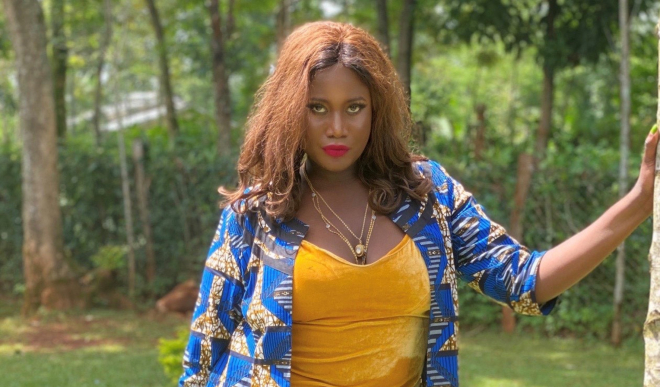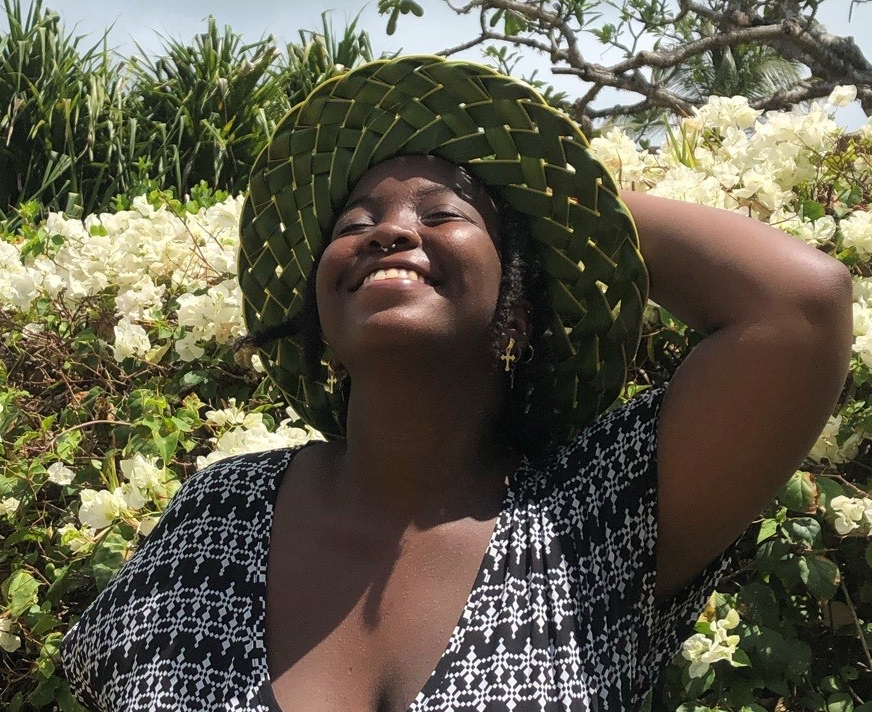07-12-2021
During the last Orange the World campaign, WO=MEN published six different portraits of women human rights defenders from around the world. Courageous women, who have dedicated their lives to their cause. And who have chosen not to be a victim, but a fighter. This is part five: Alesandra Ogeta, Director of Programs for Jinsiangu, a locally registered Kenyan CBO based in Nairobi.
Read part one: The Girl who wrote to Uganda's parliament, part two: The Most Outspoken Sex Workers on the Continent, part three: I’ve Been Fighting Since I Was Twenty, part four: Women Aren’t Safe Here, And That’s In So Many Ways and part six: People Should Have The Right To Love.
Stories by Makena Ngito.
Authority isn’t this high level of power that is only attainable if you stand in front of a parliament and cry your heart out for them to listen to you. And a lot of people really don’t realize this. You probably say hi to the area chief every morning on your way to work. You both go to the same church and grab a pint at the same pub. But you don’t realize that this is the very first person to go to whenever there’s an issue.
Of course, it would be more accurate to say that, in the African setting, the very first person to go to is family. Whether it’s your family or that of the person that has wronged you. Whether it’s an issue at work, and regardless of the fact that you know they might not have a solution. Or, on the flip side of things, they might bring an issue forward to you.
And for me, that issue was, why am I the way I am?
I think Alesandra is probably one of the most gorgeous women I’ve met yet. E-met, is the word to use. I was seated on my armchair, waiting for her to hop on the Zoom Call. I’ve realized that as a writer, I build these images of people before I meet or talk to them. What they may look like, how tall they are, what they sound like… even where they live and what they sound like when they laugh. Then she came on the screen, and the first thought I had was how beautiful she was, and how well she carried it. Not a single doubt in her mind that she turns heads when she walks.
But her reason for turning heads isn’t always related to her beauty. Because Alesandra Ogeta is a trans woman living in Kenya, and that single act itself of daring to be is enough for her to get persecuted on a daily basis.
To take it even further, she is a trans woman who has dedicated her life to defending her fellow trans folk, making it her work to ensure that they are safe, protected and have access to facilities and services.
During our conversation, she brought up something really interesting. When we create safe spaces, we often forget how there’s still no change in the outside world, and we can’t fully exist in these spaces without interacting with the other side. And the frustration and harm this causes is systemic, a perfect example being seen in the whole process of proper documentation for trans, intersex and gender non-conforming people. If you can’t have your correct name and gender on your official documents, that makes really delicate matters like money and banking really hard to navigate. And you might be thinking, well, you can just avoid banks and operate outside them, but apart from the fact that most Kenyans largely rely on the mobile money transfer service known as M-Pesa, avoiding banking means a lack of access to loans.
"We can offer safe housing, we can offer food, and clothing, even legal services for INTGC folk who need it, seeing as even access to representation is a huge issue, with everyone so afraid to represent someone ‘different. But we can only do so much. We can’t offer loans or capital for our community members to start businesses.”
And that’s why the focus is on changing things right from the top. It’s working with other organizations in the same field. It’s reaching out to administration, right from the first level that’s the chief and other area administrators, because these are the people that are on the ground. The ones with the immediate power to stop the violence and educate people. They are at face level. And going all the way up to ministries and policy makers to change the laws around the community.
And we have seen the impact of our work, oh yes, we have.
Having Kenya become the first African country and one of the only countries in the world recognize intersex people during the last census is a huge, huge milestone. Having the Ministry of Gender ask for full research to be conducted about intersex people living in Kenya, including their lived experiences, the challenges they face and possible solutions for them is a feat that we could only dream about a few years ago.
And yes, finally getting acknowledged by the government does not make us more of who we are. We have already done the internal work of knowing ourselves, answering the questions in our heads about our identities and handling ourselves with grace when we don’t have all the answers. It’s learning to accept who we are, and being proud of it in a society that goes out of its way to hate us, that goes a step further to even teach us how to hate ourselves, teaching us all the words for it, and detesting us even more when we refuse to learn that hatred. We take that acknowledgement as us finally getting our rights. Finally being able to exist under the law, and not against it. Finally breathing.
And we shall breathe. We shall take slow, conscious sips of air, not hurried gulps, afraid that someone will catch us existing and take us to the cross for it. We shall hold hands when we walk. We shall use our correct pronouns when ordering in restaurants, not afraid to out ourselves. We will have a whole collection of wigs that will not just sit there in our closets and gather dust, instead, we will wear them out in the streets and flip them proudly, not afraid that a group will stare at us for too long and follow us home.
We shall live. We shall live in our truths and identities and not be afraid to laugh too loudly or love to openly.
"I wanted to work on matters that speak to people like me. I wanted us to feel represented, to know that there’s hope for a better future. I wanted to fight for them, for us, and I hope they know that the only way from here is up.”
About the author:
Bios are interesting to me, and I’ll use one of my favourite things in the world to summarize it. They’re like trying to fit the vastness of the ocean, it’s size, beauty and might, into a glass. My name is Makena Ngito, and I’m a writer. I use words to describe myself, to explain things actions couldn’t show and to capture the beauty of my thoughts in a paragraph when speech fails me. I hope you like my words. I hope they light up that little part of you that you’d forgotten exists, and I hope they stay in your memories forever too.

